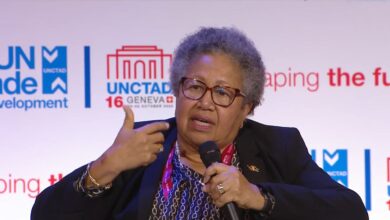(CARICOM Secretariat, Turkeyen, Greater Georgetown, Guyana) Heads of Government of the Caribbean Community (CARICOM) have agreed that the Caribbean Development Bank (CDB) should be a vehicle for all development resources of the Region and in this regard should be restructured to become more responsive to the needs of the Region. Meeting in Special Caucus at the Diplomatic Centre, Port of Spain, Trinidad and Tobago, the CARICOM Leaders said that this responsiveness should be exercised in a responsible and sustainable manner.
The meeting on Sunday 24 May was called to address the deterioration in regional economies as a result of the fallout of the global financial and economic crisis. The leaders, with the assistance of the CARICOM Secretariat, the Organisation of Eastern Caribbean States (OECS) Secretariat, the Eastern Caribbean Central Bank (ECCB) and the CDB sought to identify ways out of the crisis and the actions required to achieve that goal.
The Heads of Government appointed a team led by Dr DeLisle Worrell, Executive Director of the Caribbean Centre for Money and Finance and including Mr Derrick Latibeaudiere, Governor of the Bank of Jamaica, Dr Shelton Nicholls, Deputy Governor of the Central Bank of Trinidad and Tobago, and Dr Garth Nicholls, Senior Director, Research Division of the ECCB to review the plans of Member States and examine their sustainability and try to incorporate those plans into a regional programme. The leaders stated that any regional programme should be sensitive to the peculiar needs of the OECS.
The Team should report back to the Conference of Heads of Government on specific proposals regarding: an approach to International Financial Institutions to request special considerations for CARICOM countries given their unique circumstances of size and vulnerability. Additionally, the Team should formulate proposals on a short-to medium term strategy for the economic transformation of Member States.
The Heads also issued an invitation to the Community’s Central Banks to put together options for debt management strategy.
With respect to the CDB, the Government of Trinidad and Tobago stated that it was prepared to put its Petroleum Fund under the management of the CDB as well as to support the incorporation of the CARICOM Development Fund (CDF) into the CDB. With effect from 2010, Trinidad and Tobago said it was prepared to make a firm contribution to the Petroleum Fund under different governance arrangements within a restructured CDB. The Region’s development partners would then be asked to match the funds placed in the CDB which would then be able to help the development needs of the Region significantly.
In regard to the IMF the Heads of Government reiterated the need for a departure from the IMF traditional model. They indicated there should be two sets of standards – one for developed countries and one set for developing countries.
The Heads of Government agreed that the situation required immediate action, particularly for those countries which are already in difficulty, but also agreed that such action must be taken within a context of a long-term strategy to reverse the debilitating economic trends which appear to be endemic to our economies. They urged that the post-crisis situation should see the emergence of a transformed regional economy. They urged the technical officials to prepare a regional medium term framework that might show higher levels of deficits at this time but allow for the emergence of a transformed region over time.
The Heads of Government further agreed that all countries considering approaches to the International Monetary Fund (IMF) should move as fast as possible in that regard and should not limit their requests to the exogenous shock window due to the small sums available under that window.
The Heads of Government referred to a World Bank report which identified four areas as important to the future of the region. The first was Information and Communications Technology (ICT) and related services. The leaders stated that there was a need for connectivity across the Region and a reduction in the cost of broadband access so that this area could become an avenue to generate jobs.
The second area was the export of educational services and the Heads of Government pointed to the need for an online university to which all of the population could have access as well as the necessity for the reform of the Caribbean Examinations Council (CXC).
The Heads of Government said that the third and fourth areas could be coupled, with the Region becoming a destination for medical services as part of a new type of multi-destination tourism.





